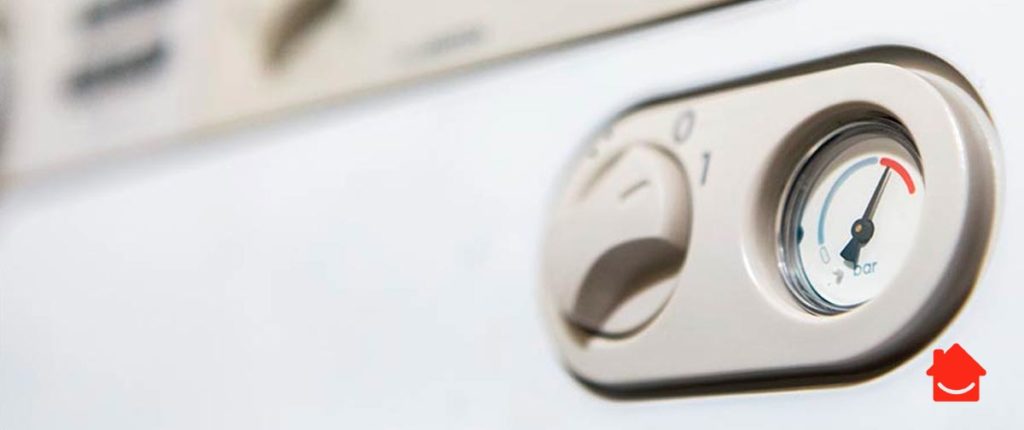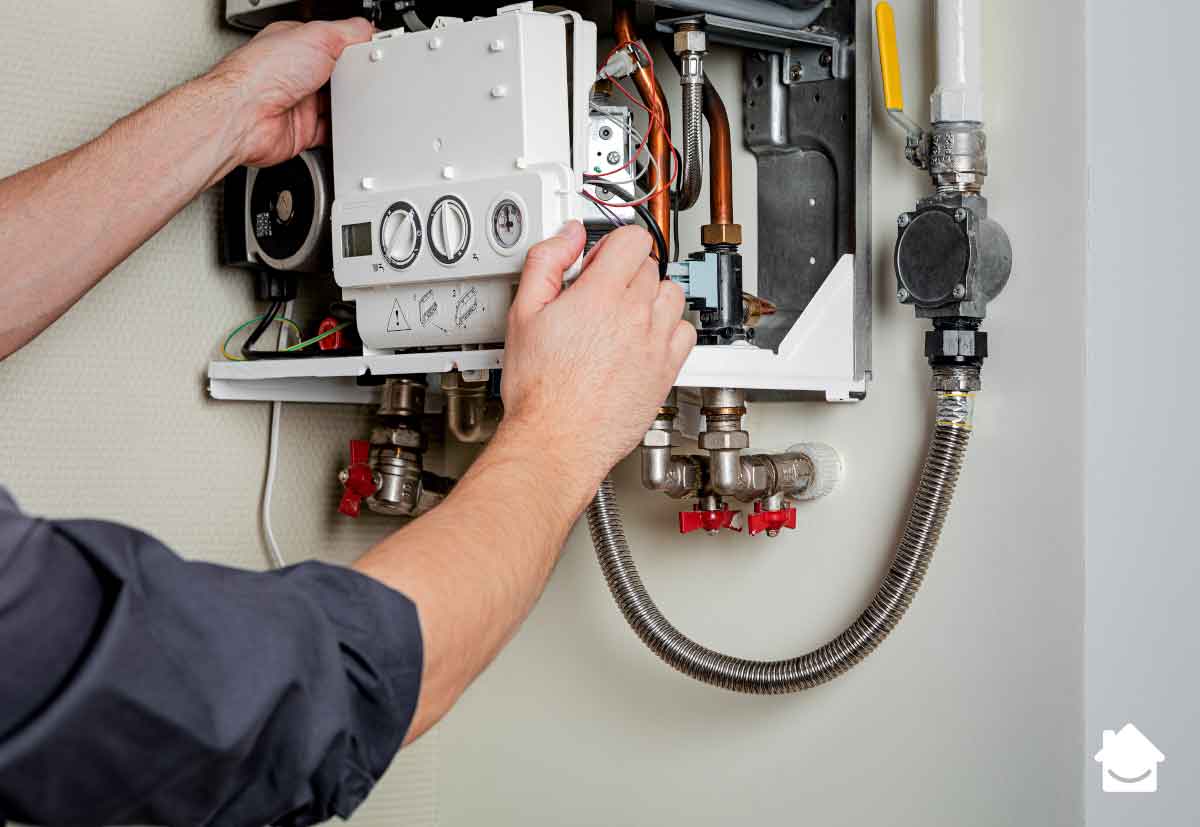A leaking boiler is a fairly common problem. Once identified, it should be dealt with as soon as possible to prevent any lasting damage. In this article, we’ll help you diagnose your leaking boiler and provide you with an insight into some possible causes – we’ll also recommend the best solution.
How to diagnose a leaking boiler
Top causes for your boiler leaking
What to do if you have a leaking boiler
Is a leaking boiler an emergency?
How to fix a leaking boiler
How to prevent a leaking boiler
How to diagnose a leaking boiler
It can be difficult to find out the exact cause behind your leaking boiler; the leak can stem from the inside or outside of your boiler.
Possible causes include failed seals or joints, or an element within the boiler that is responsible for carrying water may have cracked or split. High water pressure is also a common cause of boiler leaks.
Here are a few things to look out for:
- Drips or damp patches below the boiler
- Signs of surface corrosion on the boiler casing and pipework
- A pressure gauge showing a level higher or lower than 1.5.
Leaking boiler error codes
Modern boilers are designed to display error codes to communicate that there is an issue with the boiler. Check our list of boiler error codes associated with boiler leaks for different boiler brands:
- Ideal boiler fault codes
- Worcester Bosch boiler fault codes
- Vaillant boiler fault codes
- Baxi boiler fault codes
- Vokèra boiler fault codes
What to do if you have a leaking boiler
Why is your boiler leaking?
There are a number of possible root causes for your leaking boiler. Below we identify some of the most common causes and provide you recommendations for possible fixes.
Boiler pressure issues

Unless you have an open vented central heating system (which can be recognised by the feed and expansion tanks in the loft) and are not pressurised, your boiler’s pressure should be between 1 and 2 bars (ideally 1.5). If the pressure exceeds this, the pressure relief valve will leak water to ease the pressure.
On a sealed heating system if water begins to escape from the system it could mean that there is an issue and potential leak that is causing the system to release an unusual amount of excess pressure. It’s also worth noting that low boiler pressure is often marked as an indication that there is a leak.
Self-fix tip: You could try to reduce the boiler’s pressure yourself by trying a few DIY tricks like bleeding your radiators. If the issue persists, we recommend contacting a Gas Safe registered engineer to resolve the issue.
Corrosion
Corrosion in boiler pipes or tanks can cause these elements to weaken and begin to allow water to escape. If it is just one single part of your boiler that has become corroded (for example the valve), you may be able to resolve the issue by getting the part replaced. However, if the corrosion is widespread, it may be best to invest in a brand-new boiler.
Temperature issues
When a boiler’s temperature level is too high, it may begin to leak. This issue could be caused by a fault with the temperature sensors within the boiler, you should contact a Gas safe registered engineer for help.
Impaired seals
Water can escape when a boiler’s seals become damaged. This could then cause the water that is pushed by the system’s pump to leak through them. To fix this issue, it is usually recommended to have both the seal and the pump replaced. Visit HomeServe Repairs to find out more.
Cracks in the boiler body
It is normal for your boiler to develop some flaws over time. The repetitive warming and cooling that takes place within the heat exchanger will cause the metal to expand and contract, which could eventually lead to a crack or a split. Cracks and splits in boilers tend to be serious issues with expensive repair costs, so it may be best for you to consider getting a new boiler installed.
Installation faults
When heating systems develop leaks around their pipe fittings, it can be due to low-quality installations. These kinds of issues can develop when an engineer has not worked to a high standard or has failed to follow regulations. With HomeServe, you get peace of mind in knowing that your Home Expert is Gas Safe Registered and fully trained to conduct thorough and professional boiler installations and fixes to previous heating system installation faults.
The cost of getting an installation fault fixed will depend on the nature of the issue and whether it has caused any lasting damage. Find out more about repair costs by visiting HomeServe Repairs.
Loose joints
Much like cracks and splits, this problem tends to develop due to hot and cold contraction and expansion. This issue can be quite simple to fix. Contact us to organise a visit from one of our engineers who could easily do the job for you.
What to do if you have a leaking boiler
A leaking boiler can be worrying, but there are measures you can take to contain the leak and ensure that minimal damage or impact is caused to the boiler and the area surrounding it.
These include:
- Check around the area once again to ensure that all leaks have been located
- Contain the leak using a bucket or container
- Where possible, isolate the water supply to the boiler
- If you cannot contain the leak, it may be best for you to turn off the mains cold water stop tap and switch off the electric supply to your boiler
- Check your boiler pressure
- Contact a Gas Safe registered engineer
Is a leaking boiler an emergency?
Though it is not as serious as a gas leak, a leaking boiler could indicate a more serious problem. It could also cause issues such as short-circuiting, rusting and it could also cause damage to other elements in your home. If your heating system has developed a leak, HomeServe’s qualified Home Experts can provide you with the help you need to get your home heating back up and running effectively; whether you are in need of a repair or a brand new boiler.
How to fix a leaking boiler
Due to the possibility of there being underlying issues that could be causing your boiler to leak, it is typically recommended for you to consult a professional engineer who can diagnose and rectify the problem effectively.
As previously mentioned, DIY tasks such as bleeding your radiators can help when issues such as high boiler pressure are the cause of the leak, however, the majority of the causes for leaks should be left to the attention of a Gas Safe Registered engineer.
How to prevent a boiler leakage

The best way to help prevent boiler leaks is to ensure that your boiler and heating system is maintained appropriately. Here’s a list of a few measures that you can take to ensure that your boiler remains in tip-top shape.
- Ensure that your boiler receives a yearly service
- Install a magnetic boiler filter – these help to collect any debris from within the system which may have otherwise caused issues such as blockages.
- Ensure that the inhibitor within the heating system is sufficient and topped up as necessary
Find out more information about boiler maintenance by visiting our “10 Boiler Maintenance Tips” article.
In summary, a leaking boiler is not an uncommon issue, so try not to panic. There are DIY fixes that could help with the issue, but you should always seek to uncover the underlying cause – a job best left to a professional. Whether the culprit is an impaired seal or corrosion, it’s always best to seek help from a qualified engineer as soon as possible to prevent any serious damage. At the same time, if your boiler is old and inefficient, it may be best for you to invest in a brand-new boiler.
Don’t let boiler breakdowns catch you off guard
Worried about unexpected boiler breakdowns? HomeServe Boiler Cover is here to help give you peace of mind, with protection you can rely on.
The above information has been provided by HomeServe for information only and is not a substitute for a qualified engineers assessment or diagnosis. HomeServe is not recommending or endorsing any “Do it yourself” style boiler fixing as a result of the information provided. All heating systems differ in type (fuel and installation) and repairing electric or fuel appliances may pose a significant risk to health and safety where a person is not suitably qualified to undertake such a repair or diagnosis.



